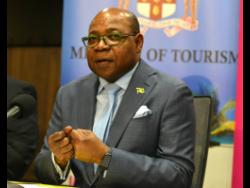
Minister of Tourism Edmund Bartlett says there are some valuable lessons to be learnt from the coronavirus pandemic (COVID-19), which, if heeded, should make the world a better place.
Bartlett, in a podcast on tourism resilience and recovery on March 27, said that the COVID-19 pandemic has also reminded us that in spite of the lines of demarcation that are drawn up to separate ourselves in daily lives such as class, wealth, zip code, job, religion, and nationality, there is ultimately one human race, sharing the same vulnerabilities and locked into the same fight for its survival.
“This pandemic has indeed offered a very profound lesson in humility by showing us that irrespective of development disparities and against the assumption of the supremacy of some countries, all countries have their moments of strength and weakness that will become self-evident at the right time,” the minister argued.
“In an ironic twist of fate, historically embattled and volatile states and regions have become safer grounds, even if only temporarily, in the fight against the COV1D-19 pandemic than many countries that have become global symbols of power, control, and security,” he added.
Embracing Future Norms
The minister added that the crisis has also forced us to quickly embrace the norms of the future digitalised economy in which business relationships and transactions will become increasingly mediated by digital technology.
This new economic paradigm, he added, will provide us with an opportunity to discover new modes of functionality and productivity, allowing us to balance mobility with responsibility, and will help to generate business models that are more resistant to future public-health crises.
“Indeed, the adjustments we are now being forced to make, in terms of shifting to remote services and working remotely, will become the new normal, underpinning the ethos of public- and private-sector organisations in many countries in the post-COVID-19 era,” Bartlett further noted.
The minister said that facing isolation, reduced trade, reduced inbound travel and tourism, and the possibility of economic recession due to the inter-connectedness of the global economy, many countries have now been forced to discover new sources of competitive advantage and survival, which they are now locating within their own national borders and which they have traditionally overlooked or underutilised.